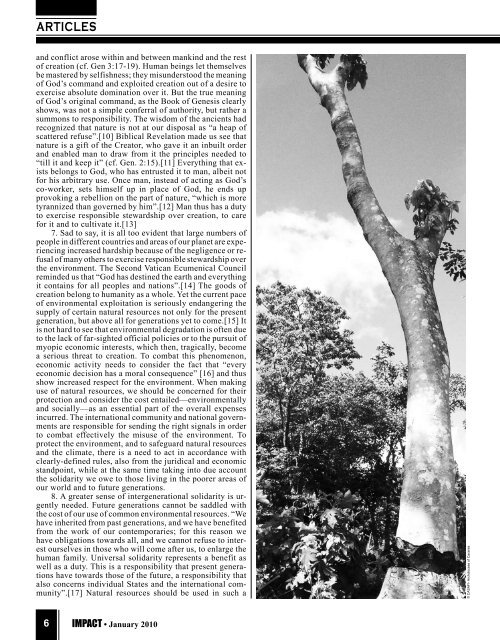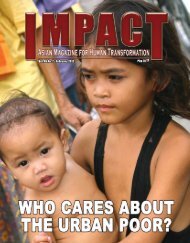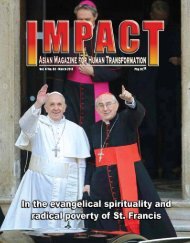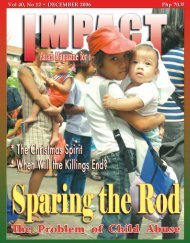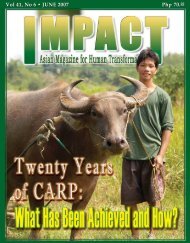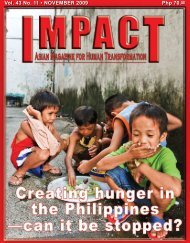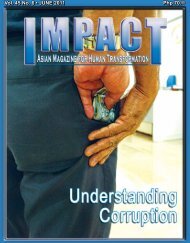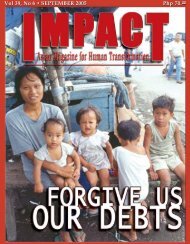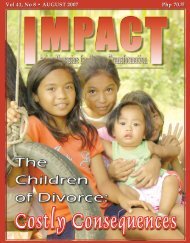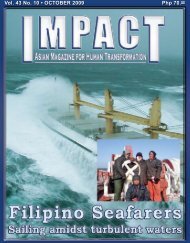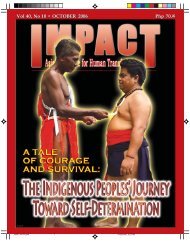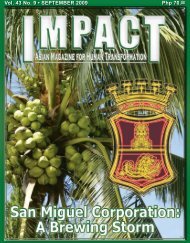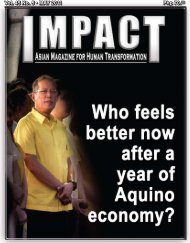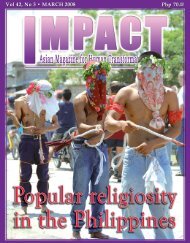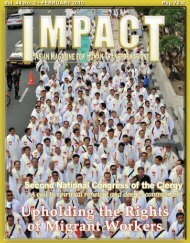Php 70.00 Vol. 44 No. 1 • JANUARY 2010 - IMPACT Magazine Online!
Php 70.00 Vol. 44 No. 1 • JANUARY 2010 - IMPACT Magazine Online!
Php 70.00 Vol. 44 No. 1 • JANUARY 2010 - IMPACT Magazine Online!
Create successful ePaper yourself
Turn your PDF publications into a flip-book with our unique Google optimized e-Paper software.
ARTICLES<br />
and conflict arose within and between mankind and the rest<br />
of creation (cf. Gen 3:17-19). Human beings let themselves<br />
be mastered by selfishness; they misunderstood the meaning<br />
of God’s command and exploited creation out of a desire to<br />
exercise absolute domination over it. But the true meaning<br />
of God’s original command, as the Book of Genesis clearly<br />
shows, was not a simple conferral of authority, but rather a<br />
summons to responsibility. The wisdom of the ancients had<br />
recognized that nature is not at our disposal as “a heap of<br />
scattered refuse”.[10] Biblical Revelation made us see that<br />
nature is a gift of the Creator, who gave it an inbuilt order<br />
and enabled man to draw from it the principles needed to<br />
“till it and keep it” (cf. Gen. 2:15).[11] Everything that exists<br />
belongs to God, who has entrusted it to man, albeit not<br />
for his arbitrary use. Once man, instead of acting as God’s<br />
co-worker, sets himself up in place of God, he ends up<br />
provoking a rebellion on the part of nature, “which is more<br />
tyrannized than governed by him”.[12] Man thus has a duty<br />
to exercise responsible stewardship over creation, to care<br />
for it and to cultivate it.[13]<br />
7. Sad to say, it is all too evident that large numbers of<br />
people in different countries and areas of our planet are experiencing<br />
increased hardship because of the negligence or refusal<br />
of many others to exercise responsible stewardship over<br />
the environment. The Second Vatican Ecumenical Council<br />
reminded us that “God has destined the earth and everything<br />
it contains for all peoples and nations”.[14] The goods of<br />
creation belong to humanity as a whole. Yet the current pace<br />
of environmental exploitation is seriously endangering the<br />
supply of certain natural resources not only for the present<br />
generation, but above all for generations yet to come.[15] It<br />
is not hard to see that environmental degradation is often due<br />
to the lack of far-sighted official policies or to the pursuit of<br />
myopic economic interests, which then, tragically, become<br />
a serious threat to creation. To combat this phenomenon,<br />
economic activity needs to consider the fact that “every<br />
economic decision has a moral consequence” [16] and thus<br />
show increased respect for the environment. When making<br />
use of natural resources, we should be concerned for their<br />
protection and consider the cost entailed—environmentally<br />
and socially—as an essential part of the overall expenses<br />
incurred. The international community and national governments<br />
are responsible for sending the right signals in order<br />
to combat effectively the misuse of the environment. To<br />
protect the environment, and to safeguard natural resources<br />
and the climate, there is a need to act in accordance with<br />
clearly-defined rules, also from the juridical and economic<br />
standpoint, while at the same time taking into due account<br />
the solidarity we owe to those living in the poorer areas of<br />
our world and to future generations.<br />
8. A greater sense of intergenerational solidarity is urgently<br />
needed. Future generations cannot be saddled with<br />
the cost of our use of common environmental resources. “We<br />
have inherited from past generations, and we have benefited<br />
from the work of our contemporaries; for this reason we<br />
have obligations towards all, and we cannot refuse to interest<br />
ourselves in those who will come after us, to enlarge the<br />
human family. Universal solidarity represents a benefit as<br />
well as a duty. This is a responsibility that present generations<br />
have towards those of the future, a responsibility that<br />
also concerns individual States and the international community”.[17]<br />
Natural resources should be used in such a<br />
© CASAFI- Archdiocese of Caceres<br />
6<br />
<strong>IMPACT</strong> <strong>•</strong> January <strong>2010</strong>


